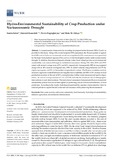Mostrar el registro sencillo del ítem
Hydro-environmental sustainability of crop production under socioeconomic drought
| dc.creator | Salari, Samira | es_ES |
| dc.creator | Karandish, Fatemeh | es_ES |
| dc.creator | Haghighat jou, Parviz | es_ES |
| dc.creator | Martínez Aldaya, Maite | es_ES |
| dc.date.accessioned | 2023-05-02T14:46:28Z | |
| dc.date.available | 2023-05-02T14:46:28Z | |
| dc.date.issued | 2023 | |
| dc.identifier.citation | Salari, S., Karandish, F., Haghighat Jou, P., & Aldaya, M. M. (2023). Hydro-environmental sustainability of crop production under socioeconomic drought. Water, 15(2), 288. https://doi.org/10.3390/w15020288 | en |
| dc.identifier.issn | 2073-4441 | |
| dc.identifier.uri | https://hdl.handle.net/2454/45214 | |
| dc.description.abstract | A comprehensive framework for revealing the jeopardization between SDGs 2 and 6 is provided in this study. Along with a water footprint (WF) assessment, the 30-years pattern of agricultural WFs and its hydro-environmental, social, and ecopolitical (SEP) consequences were quantified for the major food producer regions of Iran, as it is a water-bankrupted country under socioeconomic drought. In addition, the enforced impacts of major water/food-related policies on environmental sustainability were analyzed through an institutional assessment. During 1986–2016, BWS and GWD raised with annual average rates of 5% and 44%, respectively. Consequently, SEP status prospered along with an 18% increase in irrigated area, 198% in added-value by crop production and 5% by staple-crop exports, and 51% in the number of agricultural workers. The Pearson correlation analysis revealed a significant tradeoff between self-supplied food availability and SEP. A 54% increase in food production occurred at the cost of 80% overexploitation in blue water resources and quality degradation. An annual average increase of 1.1% in P/ETo indicates the dominant role of anthropogenic interventions in such deteriorations. The institutional assessment demonstrated that environmental sustainability policies have never been applied as promoting policies to boost self-sufficiency in food production. According to the results, hydrological sustainability requires a transformative vision in national policies to exploit limited water and soil resources while preserving the environment. | en |
| dc.format.mimetype | application/pdf | en |
| dc.language.iso | eng | en |
| dc.publisher | MDPI | en |
| dc.relation.ispartof | Water 2023, 15(2), 288 | en |
| dc.rights | © 2023 by the authors. Licensee MDPI, Basel, Switzerland. This article is an open access article distributed under the terms and conditions of the Creative Commons Attribution (CC BY) license. | en |
| dc.rights.uri | http://creativecommons.org/licenses/by/4.0/ | |
| dc.subject | Blue water scarcity | en |
| dc.subject | Cash-scarce community | en |
| dc.subject | Environmental deteriorations | en |
| dc.subject | Food insecurity | en |
| dc.subject | Hydrological sustainability | en |
| dc.subject | Intensive agriculture | en |
| dc.title | Hydro-environmental sustainability of crop production under socioeconomic drought | en |
| dc.type | Artículo / Artikulua | es |
| dc.type | info:eu-repo/semantics/article | en |
| dc.date.updated | 2023-05-02T14:35:39Z | |
| dc.contributor.department | Institute on Innovation and Sustainable Development in Food Chain - ISFOOD | en |
| dc.rights.accessRights | Acceso abierto / Sarbide irekia | es |
| dc.rights.accessRights | info:eu-repo/semantics/openAccess | en |
| dc.identifier.doi | 10.3390/w15020288 | |
| dc.relation.publisherversion | https://doi.org/10.3390/w15020288 | |
| dc.type.version | Versión publicada / Argitaratu den bertsioa | es |
| dc.type.version | info:eu-repo/semantics/publishedVersion | en |



